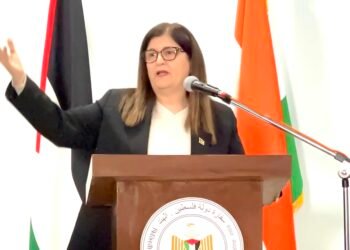NEW YORK: The 80th session of the United Nations General Assembly witnessed what many are calling a historic breakthrough: a wave of recognitions of Palestinian statehood by countries including the United Kingdom, Canada, Australia, France, Portugal, Belgium, Luxembourg, Malta, Andorra, and others.
The adoption of the New York Declaration under the theme “Better together: 80 years and more for peace, development and human rights” was framed as a turning point in the international legitimacy of the Palestinian cause.
Yet as leaders applauded in New York, the reality in Gaza could not have been more detached from the global stage. On Tuesday, Israeli fire killed at least twenty-two Palestinians, including eighteen in Gaza City, while tanks pressed deeper into its western neighborhoods. Three hospitals shut down as fuel ran out.
Families fled with carts piled with what little they could carry. Amid the rubble, Gazans ask: what does recognition mean if it doesn’t stop the bombs?
Symbolism matters in international diplomacy. Recognition of Palestine by influential Western powers undermines Israel’s long-standing claim that a Palestinian state is impossible and signals a seismic shift in the politics of global legitimacy.
For decades, the two-state solution envisioned in the 1993 Oslo Accords remained frozen. Today, by sheer diplomatic weight, Palestine is inching closer to formalized recognition. But in Gaza, symbolism does not fill empty stomachs, treat the wounded, or silence the explosions. “We are not steadfast, we are helpless.
The world is celebrating, but we are dying,” said Huda, a mother of two in Gaza City. Her words capture the contradiction: a people celebrated in resolutions yet suffocated in reality.
At the UNGA, world leaders spoke of peace, justice, and reconciliation. The New York Declaration emphasized timebound and irreversible steps toward a two-state solution, the disarmament and removal of Hamas from governance in Gaza, and commitments to rebuilding Palestinian institutions.
French President Emmanuel Macron framed recognition as a moral responsibility, while Arab and European leaders demanded an end to occupation and collective punishment. Even U.S. President Donald Trump—once the architect of hardline proposals for Gaza’s “permanent displacement” is now floating new governance plans involving Arab and Muslim-majority countries, with funding and security guarantees.
But skepticism runs deep. Israel remains defiant. Prime Minister Benjamin Netanyahu declared that “no Palestinian state will ever be established” as long as Hamas exists, vowing to press ahead with military operations. For Palestinians in Gaza, there is no sense that international recognition translates into immediate protection.
The humanitarian toll is staggering. Local authorities report over sixty-five thousand deaths since the war began. Entire neighborhoods in Gaza City have been reduced to rubble. Hospitals are collapsing under shortages of medicine, fuel, and equipment. Parents cradle children trembling from the sounds of ceaseless airstrikes.
Every declaration in New York contrasts with the lived experience of Gazans. “Are we now being killed as citizens of the state of Palestine? Is that what has changed?” asked Abu Mustafa, a displaced resident of Gaza City. His question pierces the gap between recognition and reality: states may sign declarations, but the war machine grinds on.
This recognition wave has broader implications. It signals a shift in Western consensus, with countries like the UK and Canada breaking ranks with Washington, leaving the U.S. increasingly isolated. It strengthens Global South alignment on Palestine as part of a wider push for justice and decolonization. It increases diplomatic pressure on Israel, which risks boycotts, sanctions, and further erosion of legitimacy. And it tests the very credibility of multilateralism: if the UN cannot translate recognition into protection, its moral authority as a guardian of human rights will be questioned.
Donald Trump’s plan to convene a meeting with Saudi Arabia, the UAE, Egypt, Jordan, Turkey, Indonesia, and Pakistan adds another layer of uncertainty. His earlier proposal of a U.S. takeover of Gaza was denounced as “ethnic cleansing.”
Now, Washington wants Arab forces to take over Gaza’s security while the U.S. coordinates reconstruction. Arab capitals remain cautious. Any foreign deployment in Gaza risks being seen as collaboration, unless tied to a binding end to occupation and recognition of Palestinian sovereignty. Without clear guarantees, Trump’s proposals may deepen distrust rather than resolve it.
The recognition of Palestine is historic. It reshapes global diplomacy, undermines Israeli narratives, and signals a moral awakening. Yet for exhausted Gazans, it is also painfully hollow. Recognition does not stop the shelling, feed the hungry, or keep hospitals running.
The world must now move beyond declarations: humanitarian corridors to deliver food, water, and medicine, international protection mechanisms to shield civilians, binding timelines for negotiations monitored by neutral guarantors, and accountability for violations of international law. Without these steps, recognition risks becoming a cruel irony: a state declared into existence as its people are destroyed.
The recognition of Palestine at the UNGA is a diplomatic earthquake. But for the families of Gaza, pulling carts of belongings through bombed streets, it is an earthquake that brings no shelter. The gap between New York’s applause and Gaza’s agony exposes the bankruptcy of a diplomacy that stops at symbolism. If the world truly believes in peace, it must act, not just recognize.
History will not remember the applause in New York if it is drowned out by the silence of Gaza’s dead. Recognition is not enough, relief must come now!
-Dr. Shahid Siddiqui from New York; follow via X @shahidsiddiqui

















